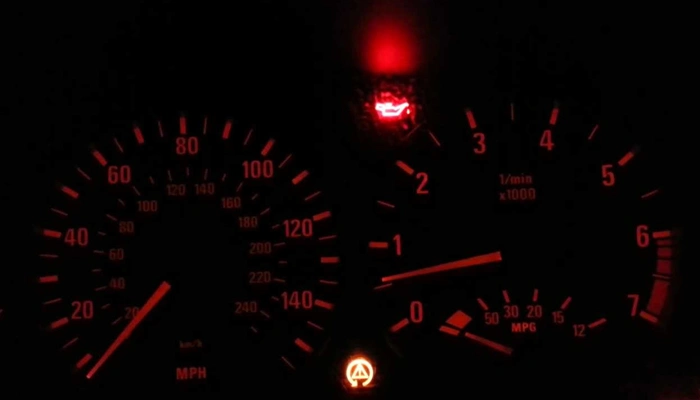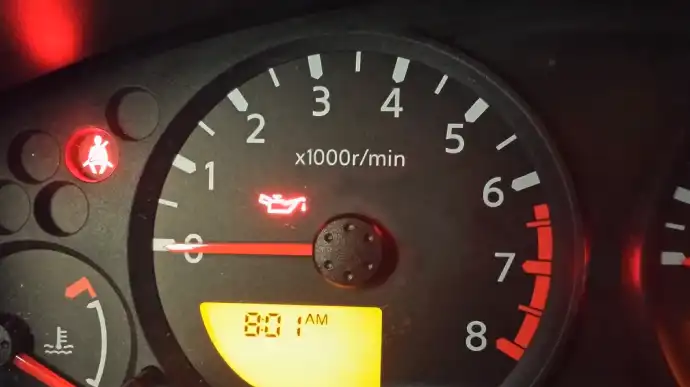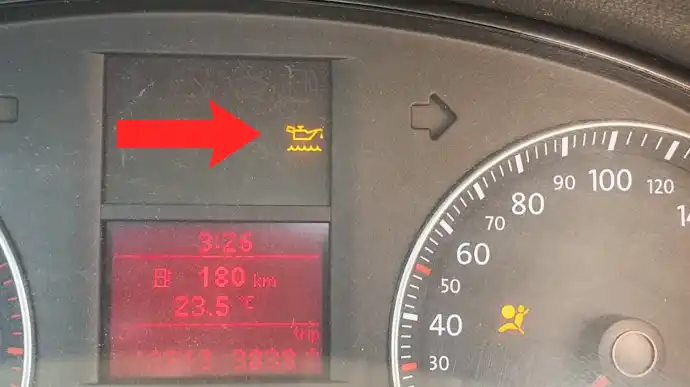Physical Address
304 North Cardinal St.
Dorchester Center, MA 02124
Physical Address
304 North Cardinal St.
Dorchester Center, MA 02124

A flickering oil light is a concerning experience since it can indicate several mechanical problems within your vehicle. It’s difficult to determine the exact cause of a flickering oil light, but there are a few potential culprits. After conducting some research, I found several possible causes of this problem.
One of the things I noticed is that low oil levels are a common cause of flickering oil lights. When your engine doesn’t have enough oil, the oil pressure drops, which can trigger the light to turn on. Another possible cause is a faulty oil pressure sensor responsible for monitoring the pressure.
As part of this post, I will explain the different reasons why your oil light may be flickering and what you should do to fix it. By the end of this discussion, you’ll have a better understanding of the issue.

There are several common reasons I have found why your oil light may be flickering.
The oil light flickering clearly indicates that the engine isn’t receiving sufficient lubrication to function properly. When the oil level in the engine drops below the minimum level, it can lead to a decrease in oil pressure.
This decrease in oil pressure triggers the oil light to flicker as a warning sign. If left unaddressed, this can result in severe engine damage and even failure.
When the oil light is flickering, a common reason for this issue is a faulty oil pressure sensor, which can lead to inaccurate readings and cause the oil light to flicker.
The oil pressure sensor monitors the oil pressure in your engine. It sends signals to the oil pressure gauge, which illuminates the oil light on your dashboard when the pressure drops below a certain threshold.
However, if the sensor is faulty, it may provide incorrect readings or fail to detect a drop in oil pressure. This can result in the oil light flickering on and off, causing confusion and potential panic for drivers.
Another common reason for oil light flickering is bad oil conditions. When the engine oil degrades, it can’t lubricate and protect the components effectively. Over time, the oil can become contaminated with dirt, debris, and metal particles, further accelerating its degradation.
Also, old oil may lose its viscosity, becoming too thin or too thick, which can lead to insufficient lubrication or poor circulation. These issues can cause increased friction and heat within the engine, leading to potential damage and triggering the oil light to flicker.
When an engine overheats, it puts excessive strain on the oil, causing it to thin out. Thin oil fails to provide the necessary lubrication and protection to the engine components, leading to increased friction and heat. As a result, the oil pressure drops, causing the oil light to flicker.
Various factors, such as a malfunctioning cooling system, a faulty thermostat, a blocked radiator, or a damaged water pump, can cause engine overheating. It’s crucial to address engine overheating promptly to prevent further damage.
One possible cause for my oil light flickering is a blown fuse or damaged wiring. A blown fuse can occur due to a power surge or a short circuit in the electrical system. When the fuse blows, it disrupts the flow of electricity to the oil light, causing it to flicker.
Similarly, damaged or frayed wiring can lead to intermittent connections, resulting in a flickering oil light.
The presence of sludge in an engine (because of bad oil) can be a common reason for the flickering of my oil light. Sludge is a thick, gel-like substance that forms when oil breaks down and collects dirt and debris.
Over time, this sludge can accumulate in the engine, obstructing the oil passages and reducing the oil flow. When the oil flow is compromised, the pressure drops, triggering the oil light to flicker. Sludge buildup can also clog the oil pressure switch, causing it to malfunction and send false signals to the oil light.

As a way of preventing oil lights from flickering in the future, I want to share with you a few tips you can follow.
Regular oil changes are crucial for maintaining engine health and preventing potential issues. I highly recommend scheduling regular oil changes as a proactive measure to prevent the flickering of your oil light in the future.
When oil becomes old and contaminated, it loses its ability to lubricate and protect the engine effectively. This can decrease oil pressure, causing the oil light to flicker.
By adhering to the manufacturer’s recommended oil change intervals, you ensure that your engine is always supplied with clean and efficient oil. Fresh oil helps to maintain proper oil pressure, preventing the oil light from flickering and signaling potential problems.
To maintain the recommended oil grade and quantity, follow the manufacturer’s guidelines and ensure that the correct oil grade and quantity are used during each oil change.
Using the wrong oil grade can lead to improper lubrication and increased wear on engine components. Also, using too little or too much oil can cause issues. Insufficient oil can result in inadequate lubrication and increased friction, while excessive oil can lead to foaming and reduced oil pressure.
Therefore, refer to the owner’s manual and use the recommended oil grade and quantity to maintain optimal engine performance and prevent the oil light from flickering.
Using high-quality engine oil that meets the manufacturer’s specifications, you can prevent the oil light from flickering in the future. High-quality oil is specifically formulated to provide optimal protection and stability for your engine.
It contains additives that enhance its performance, such as detergents that keep engine components clean and dispersants that prevent sludge formation and deposits.
D. Replace the Oil Pressure Sensor if Needed
To prevent the oil light from flashing again in the future, I suggest you inspect and replace the oil pressure sensor if necessary. Over time, the sensor can become worn out or damaged, leading to inaccurate readings and, consequently, a flickering oil light.
Inspecting the sensor involves checking for any signs of physical damage or corrosion. If any issues are found, the sensor should be replaced with a new one.
An engine flush involves adding a cleaning agent to the engine oil, running the engine for a specified period, draining the oil, and replacing the oil filter. This process helps remove sludge and deposits that may obstruct the oil passages and cause the oil light to flicker.
Engine overheating can lead to thinning of the oil and reduced pressure, which can trigger the oil light to flicker. For a flicker-free oil light in the future, please avoid engine overheating.
One of the key ways to prevent engine overheating is to keep your cooling system in good condition. Regularly check the coolant level and ensure it’s topped up to the recommended level. Additionally, inspect the cooling system for leaks or damage and promptly address any issues.
Leaks in the oil system can lead to a gradual loss of oil, resulting in low oil pressure and potential engine damage. Regularly inspect for oil leaks, ensuring a qualified mechanic promptly repairs them.
To check for oil leaks, park your vehicle on a clean surface and inspect the ground beneath it for any signs of oil stains or puddles. Additionally, examine the engine compartment for any visible signs of oil leakage, such as wet spots or dripping oil.
A flickering oil light indicates a serious problem that requires immediate attention, and it isn’t safe to drive with a flickering oil light. Ignoring this warning can lead to engine failure, costly repairs, and compromised safety on the road.
Also, driving with a flickering oil light can further damage the engine and result in complete engine failure.
According to expert recommendations and my research, you can drive with a flickering oil light for a limited time before experiencing engine failure. Generally, you have about 500 miles of driving before a flashing oil light becomes a serious problem.
Driving with a flickering oil light for an extended period can lead to severe engine damage and costly repairs or even engine failure. So, I suggest addressing the issue immediately by having your vehicle inspected by a professional mechanic.
Several factors I have discussed about oil light flickering include a low oil level, faulty oil pressure sensor, bad oil condition, and sludge buildup in the engine. The best action is to address this problem promptly to avoid further engine damage.
If you notice your oil light flickering, don’t hesitate to seek professional advice and diagnose the problem. Also, regular maintenance, such as oil changes and engine flushes, as well as checking and replacing damaged fuses or wiring, can help prevent this problem.
Remember, a well-maintained engine is key to a long and healthy life for your vehicle. So, if your engine oil light flickers, don’t ignore it. Take action immediately.